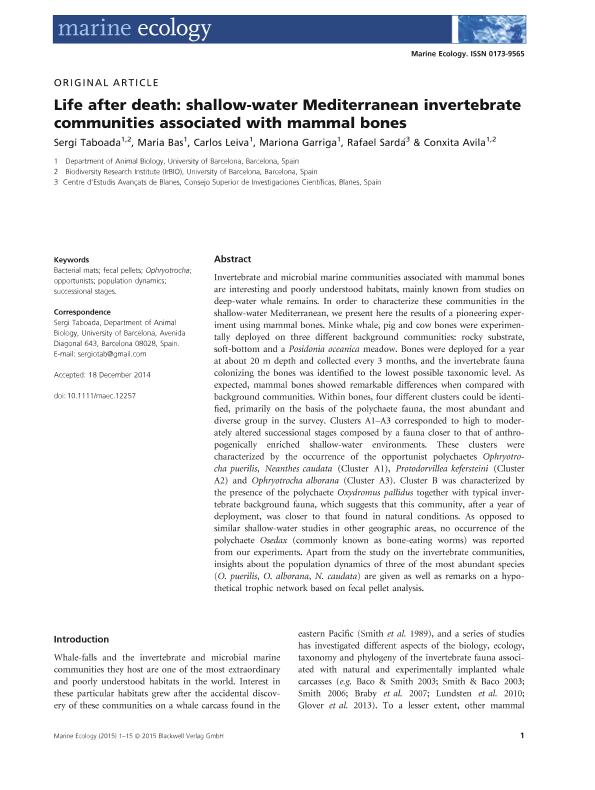Mostrar el registro sencillo del ítem
dc.contributor.author
Taboada, Sergi
dc.contributor.author
Bas López, Maria

dc.contributor.author
Leiva, Carlos
dc.contributor.author
Garriga, Mariona
dc.contributor.author
Sardá, Rafael
dc.contributor.author
Avila, Conxita
dc.date.available
2020-01-14T20:16:55Z
dc.date.issued
2016-02
dc.identifier.citation
Taboada, Sergi; Bas López, Maria; Leiva, Carlos; Garriga, Mariona; Sardá, Rafael; et al.; Life after death: Shallow-water Mediterranean invertebrate communities associated with mammal bones; Wiley Blackwell Publishing, Inc; Marine Ecology-pubblicazioni Della Stazione Zoologica Di Napoli I; 37; 1; 2-2016; 164-178
dc.identifier.issn
0173-9565
dc.identifier.uri
http://hdl.handle.net/11336/94689
dc.description.abstract
Invertebrate and microbial marine communities associated with mammal bones are interesting and poorly understood habitats, mainly known from studies on deep-water whale remains. In order to characterize these communities in the shallow-water Mediterranean, we present here the results of a pioneering experiment using mammal bones. Minke whale, pig and cow bones were experimentally deployed on three different background communities: rocky substrate, soft-bottom and a Posidonia oceanica meadow. Bones were deployed for a year at about 20 m depth and collected every 3 months, and the invertebrate fauna colonizing the bones was identified to the lowest possible taxonomic level. As expected, mammal bones showed remarkable differences when compared with background communities. Within bones, four different clusters could be identified, primarily on the basis of the polychaete fauna, the most abundant and diverse group in the survey. Clusters A1-A3 corresponded to high to moderately altered successional stages composed by a fauna closer to that of anthropogenically enriched shallow-water environments. These clusters were characterized by the occurrence of the opportunist polychaetes Ophryotrocha puerilis, Neanthes caudata (Cluster A1), Protodorvillea kefersteini (Cluster A2) and Ophryotrocha alborana (Cluster A3). Cluster B was characterized by the presence of the polychaete Oxydromus pallidus together with typical invertebrate background fauna, which suggests that this community, after a year of deployment, was closer to that found in natural conditions. As opposed to similar shallow-water studies in other geographic areas, no occurrence of the polychaete Osedax (commonly known as bone-eating worms) was reported from our experiments. Apart from the study on the invertebrate communities, insights about the population dynamics of three of the most abundant species (O. puerilis, O. alborana, N. caudata) are given as well as remarks on a hypothetical trophic network based on fecal pellet analysis.
dc.format
application/pdf
dc.language.iso
eng
dc.publisher
Wiley Blackwell Publishing, Inc

dc.rights
info:eu-repo/semantics/openAccess
dc.rights.uri
https://creativecommons.org/licenses/by-nc-sa/2.5/ar/
dc.subject
BACTERIAL MATS
dc.subject
FECAL PELLETS
dc.subject
OPHRYOTROCHA
dc.subject
OPPORTUNISTS
dc.subject
POPULATION DYNAMICS
dc.subject
SUCCESSIONAL STAGES
dc.subject.classification
Biología Marina, Limnología

dc.subject.classification
Ciencias Biológicas

dc.subject.classification
CIENCIAS NATURALES Y EXACTAS

dc.title
Life after death: Shallow-water Mediterranean invertebrate communities associated with mammal bones
dc.type
info:eu-repo/semantics/article
dc.type
info:ar-repo/semantics/artículo
dc.type
info:eu-repo/semantics/publishedVersion
dc.date.updated
2020-01-13T14:24:54Z
dc.journal.volume
37
dc.journal.number
1
dc.journal.pagination
164-178
dc.journal.pais
Reino Unido

dc.journal.ciudad
Londres
dc.description.fil
Fil: Taboada, Sergi. Universidad de Barcelona; España
dc.description.fil
Fil: Bas López, Maria. Universidad de Barcelona; España. Consejo Nacional de Investigaciones Científicas y Técnicas. Centro Austral de Investigaciones Científicas; Argentina
dc.description.fil
Fil: Leiva, Carlos. Universidad de Barcelona; España
dc.description.fil
Fil: Garriga, Mariona. Universidad de Barcelona; España
dc.description.fil
Fil: Sardá, Rafael. Centro de Estudios Avanzado de Blanes; España
dc.description.fil
Fil: Avila, Conxita. Universidad de Barcelona; España
dc.journal.title
Marine Ecology-pubblicazioni Della Stazione Zoologica Di Napoli I

dc.relation.alternativeid
info:eu-repo/semantics/altIdentifier/doi/http://dx.doi.org/10.1111/maec.12257
dc.relation.alternativeid
info:eu-repo/semantics/altIdentifier/url/https://onlinelibrary.wiley.com/doi/abs/10.1111/maec.12257
Archivos asociados
